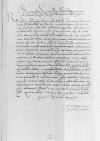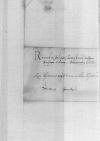Letter #1292
Sigismund I Jagiellon to Ioannes DANTISCUSVilnius, 1535-04-01
| received [1535]-04-22 Manuscript sources:
Auxiliary sources:
Prints:
| ||||||||||||
Text & apparatus & commentaryPlain textText & commentaryText & apparatus
Reverendo in Christo Patri, domino
Reverende in Christo Pater, sincere nobis dilecte.
Pro certo nobis declaravit illustris dominus
Ad mandatum sacrae


 BNW, BOZ 953, f. 132v
BNW, BOZ 953, f. 132v